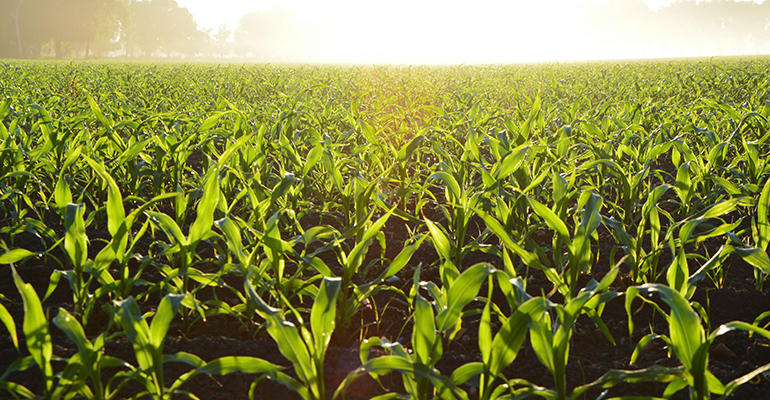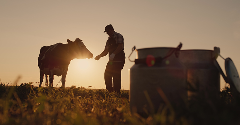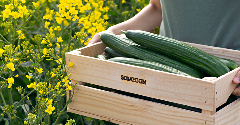News
COP26: Agricultural food system emissions not adequately addressed
30 Nov 2021The climate conversation this past November was dominated by Glasgow Climate Impact (COP26) conference where 54 nations signed a pledge to protect nature. However, while various causes of climate change were addressed, agriculture was largely left out of the equation.
According to experts, the conference did not sufficiently address the direct impact of traditional animal agriculture on climate change. Government officials from across the globe acknowledged that it was necessary to shift to more sustainable farming methods, but there was no mention of people reducing meat and dairy consumption despite cows being the No. 1 source of greenhouse gasses from agriculture.

A report from Compassion in World Farming reported by the U.K. Independent said that global meat and dairy consumption must be dramatically curtailed in order to limit Earth’s rising temperatures to no more than 1.5C. And government officials were not completely oblivious to this connection. The United Kingdom’s government proposed levying a carbon tax on animal products like beef with high emissions footprints. However, within hours of this proposal coming to the floor, it was withdrawn.
Other countries outright declined to acknowledge the connection between the consumption of animal products and climate change. The U.S. Secretary of Agriculture Thomas Vilsack said that Americans can continue consuming meat at current levels without tipping the scales on global warming. Currently, one-third of protein consumed by humans comes from animal products, according to the U.S. National Library of Medicine, and this proportion has increased steadily for decades. Between 1960 and 2010, mean consumption rose 200%.
The Guardian reported that many organizations within the U.K. also believed that new technologies can be leveraged to reduce methane emissions rather than reducing the number of cows. To help fund the creation of technologies that can combat methane emissions, U.S. president, Joe Biden and the UAE proposed $4 billion in funds for innovation aimed at reducing greenhouse gas emissions.
Despite pledges to develop more sustainable means of farming, protestors lined the streets for days in Glasgow to bring government officials’ attention to the need for more significant investment in reducing agricultural greenhouse gas emissions.
As the host of this year’s climate conference, the U.K. announced that it will launch a program to aid developing countries and small shareholder farmers to convert to more sustainable forms of farming, the Independent reported.
Related news

Soy story: WWF scores UK supermarkets on sustainability efforts
12 Nov 2025
WWF has published its latest “Soy Scorecard”, ranking UK supermarkets’ efforts to combat deforestation and land conversion in their soy supply chains.
Read more
Standing Ovation and Bel scale up casein production from dairy co-products
11 Nov 2025
Foodtech company Standing Ovation has partnered with cheese specialist Bel Group to manufacture dairy serums for industrial-scale casein production via precision fermentation.
Read more
New UPF standard hoped to offer consumers ‘coherence and clarity’
10 Nov 2025
Ingredients companies are being urged to enter “a new era of partnership and innovation” following the launch of the industry’s first non-UPF verification scheme.
Read more
Whistleblowers accuse UK meat industry of promoting cheap, unsustainable supply
7 Nov 2025
An anonymous group of industry insiders has accused the UK’s biggest food companies of systematically driving down meat quality and welfare standards.
Read more
Bord Bia presents Irish dairy ingredient suppliers at Fi Europe
6 Nov 2025
Dairygold Co-operative Society, The Carbery Group, and Ornua Co-operative: Meet with sustainable producers of Irish dairy ingredients at Food ingredients Europe 2025, Hall 7.2 Stand M18.
Read more
AI attraction means foodtech startups must ‘prove’ rather than ‘promise’
4 Nov 2025
Reports suggest that artificial intelligence (AI) is sucking investment from foodtech and agritech, but investors say the picture is complicated.
Read more
Penguin and Club bars no longer classed as chocolate
30 Oct 2025
Penguin and Club bars can no longer be classified as chocolate after the pladis-owned McVitie’s brands turned to cheaper alternatives amid the ongoing cocoa crisis.
Read more
Could plant-based protection replace plastic packaging?
29 Oct 2025
Swedish foodtech company Saveggy has launched an additive-free plant-based protection for cucumbers, offering a waste-free packaging solution for fruit and vegetables.
Read more
Does promoting protein content push up plant-based sales?
27 Oct 2025
Promoting the protein content of meat-free products is a more effective sales strategy than adding carbon labels, a study of UK bakery chain Greggs suggests.
Read more
Amazon Grocery launch aims to balance quality with affordability
22 Oct 2025
Global e-commerce giant Amazon has introduced a new private-label food brand, combining existing Amazon Fresh and Happy Belly products with new everyday items.
Read more